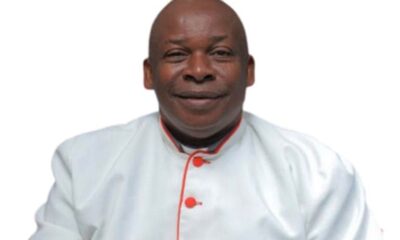human traffickingFeatures
Talking with the dead; ‘‘This is what a funeral service worker told me’’
It all started with a phone call! Yes a phone call. A friend who usually tips me for employment offers called me late in the Night telling me if I had a camera on standby so that I could grab my self an opportunity for video shooting and photographing a vigil in areas around Namugongo at a fee.
‘There is a paying photography gig, I have lost a relative and we need coverage for the entire ceremony and the final venue will be Kagote Village in Fortpotal’ He explained.
In a country where many struggle to get money, who am I to reject a paying offer? Little did I know that for the first time in life I was going to document a dead person?
For around six hours in a bus we drove to Fortpotal, Kagote Village where we had to film and take photos of the vigil.
Inside the casket, the grave and whatever came our way as instructed, we framed every single memory that came our way.
It is always a hustle departing from any village after a function in Uganda. Most events end late and finding means of transport is always a tag of war.
At Kagote, several kilometers away from Fortpotal, where both the bus station and tax park to Kampala are situated, we engaged in a serious competition for transport that even a few Boda Boda (Motorcycles) that where available had to hike fares given the clientele boom.
Our employer of the day intervened to seek any possible solution so that we may leave for Kampala in time.
The available and ‘‘reliable’’ solution was a funeral ambulance that transported the body. Help me take these guys to Kampala! My employer asked the Ambulance Driver who immediately refused but later had to accept after the intervention of his supervisor.
Inside the Funeral ambulance was a trolley where normally caskets or rather bodies are laid and on the other side was a four seater chair which we utilised.
Before setting off, two middle aged women who happened to be relatives of the deceased approached the Funeral service supervisor and asked for similar assistance. Unlike us, the two ladies were not made to beg for long but were cautioned that inside the van they were no seats left except the trolley meant for caskets.
Desperately, wanting to go back to Kampala they had no choice except to endure the creepy like van full of morgue workers and two strangers.
As the Van started, the funeral workers started sharing money and one of the girls asked ‘Can’t you share with us even though we are strangers? One of the funeral workers who told us that he works as a coroner said to her you would not like to earn a share if I explained to you the kind of service we rendered.‘Go on tell us the lady said…’The deceased had her hair plaited and they asked us to unplait it since it is against the Banyoro culture to burry someone with plaited hair. It wasn’t part of the official funeral package and so we negotiated an independent pay which we have to share amongst ourselves instead of remitting it to our boss. He explained.
Rolling her eyes in fear the lady told her fellow‘Abwooli afiire really’ (My auntie is really dead and buried) the funeral service guy replied yes we buried her and in a few hours she was sleeping in the same place you are seated.
Glaring about the frequently asked questions about death and funeral service, I looked at the ‘talkative’ funeral service guy and I asked What It’s like Working for a Funeral Home.
What It’s Like Working for a Funeral Home
Given the long distance even in a speeding ambulance with sirens on in some areas we were almost falling to sleep but here comes a conversation about the dead and funeral works.
Indeed death is a matter that concerns all that the conversation pulled the attention of whoever was in the Van except the Driver and their supervisor who slightly bumped into the conversation cautioning that the teller should consider with-holding some private information.
He told us that he never intended to work for a funeral service company, didn’t even think of it as a possibility, but my despite being broke every day , surviving on a single meal in his mother’s single room in Namasuba a Kampala suburb. He was lured to the would be filthy but paying job by a hard earning neighbour whose job wasn’t known by anyone in their village.
‘‘The first dead body I ever saw was that of a 52-year-old woman who was a VIP, Heavily bodied with shoulder-length black hair and a wounded pale body. She was curled up like a heavy luggage and in a black plastic bag. It’s the same bag we put everyone in before we stick them in the cooler along with the others.’’
Another undertaker who happened to be a mortician interjected in the conversation telling us to fear not because it is all about getting used to the process while unveiling opportunities they have in a company with a good pay.
‘Burry that fear and enjoy life like us, it is a job of talking with a non-breathing human. Cleaning, dressing and carrying that is the Job’ the mortician explained.
He told us how the company was in hunt for an-in house Photographers and make-Up artists. The Coincidence is that among the two ladies one was a make-up artist and she declined the offer as for we (The Photographers) exchanged contacts with the mortician.
Steve my crew assistant anxiously asks the process of handling a dead body and what really happens.
After going out into the van and unloading the cot, my partner and I will then return to the funeral home, morgue, or facility of choice by the family. It is business as usual cleaning the body and changing attires as prescribed by the family.
The process is always followed by Injection of 4 to 6 litres of an aseptic and sterilizing formaldehyde product a procedure that takes about one and a half hours to complete.
“Now,” We tell the family, “as with all this, you are welcome to be as part of this procedure as you feel comfortable. Some families find it easier to wait outside of the room, while others prefer to help. It’s entirely up to you.” He explains
He adds that there is always a dialogue between family and funeral workers as regards to the removal of valuables from the deceased and who to handle them among the family members or trustees. Valuables like rings or necklaces, Money or watches are always removed from the body.
“Sometimes, family members offer us the money that we find on bodies in their pockets as a token. Especially rich families” they explained.
Talking to the Dead
Empathy is something that humans always walk with. A funeral service worker who I prefer not to name and for purposes of the company’s privacy policy told me he sometimes pray for the dead, asks them to be at peace as him and his colleagues carryout the would be painfull body treatments that sometimes involve cutting of some body parts.
‘’It sometimes makes me sick. I can feel the pain, the wounds of accident bodies. One day I handled a body of a musician who I loved very much! I could feel the aching hearts, and the depth of sadness creeping into many souls. I immersed my own self into others to feel their feelings.’’ He adds
He says working with a funeral service company is a filthy paying job that can take you into people’s feelings and makes you reflect about life after death. Creepy bodies, freaky deaths and bad dreams are all part parcel.
‘‘I remember one funeral in particular: It was a One-year-old child who died in a fatal accident. Now, how the day of the funeral goes, is that we allow the family to come spend time with their loved one an hour before the services start.’’ He adds
In all my life I can never forget the pain of this little boy’s mother given the fact that he was her only son and she had her womb removed because of cancer of the uterus.
Comments






























